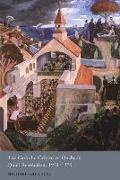Read more
The Catholic Origins of Quebecs Quiet Revolution challenges a version of history central to modern Quebecs understanding of itself: that the Quiet Revolution began in the 1960s as a secular vision of state and society which rapidly displaced an obsolete, clericalized Catholicism. Michael Gauvreau argues that organizations such as Catholic youth movements played a central role in formulating the Personalist Catholic ideology that underlay the Quiet Revolution and that ordinary Quebecers experienced the Quiet Revolution primarily through a series of transformations in the expression of their Catholic identity. In so doing Gauvreau offers a new understanding of Catholicisms place in twentieth-century Quebec. Catholicism emerges as an institution increasingly dominated by the priorities of laypeople and as the central force in Quebecs cultural transformation during the mid-twentieth century. He shows that the Church espoused a particularly radical understanding of modernity between the 1930s and the 1960s, especially in the areas of youth, gender identities, marriage, and family.
About the author
Michael Gauvreau, professor of history at McMaster University, is the author and editor of numerous works, including Mapping the Margins: Families and Social Disciplines in Canada, 1700-1970 and Cultures of Citizenship in Postwar Canada, 1940-1955.

